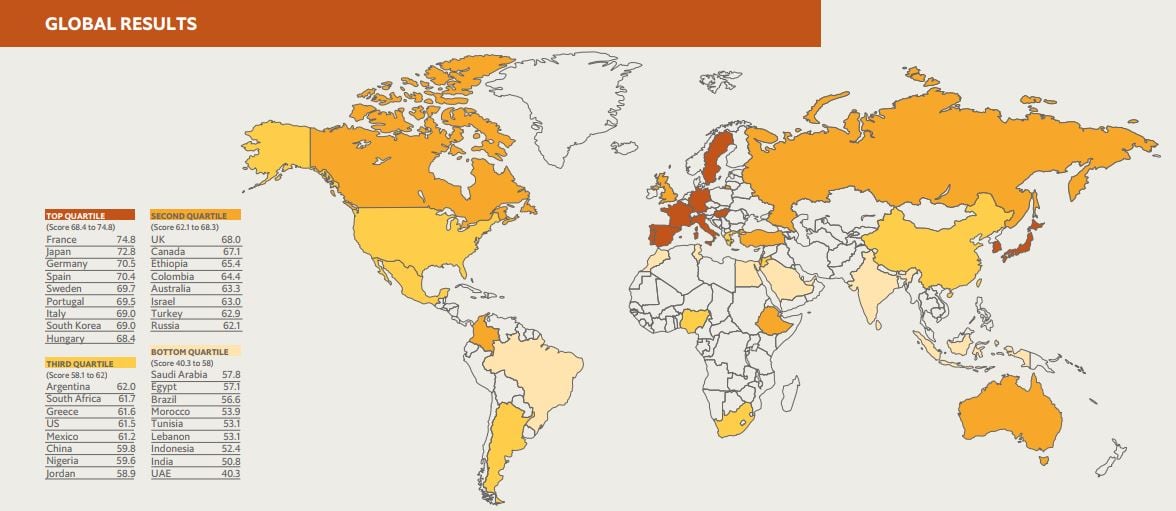Developed by the Economist Intelligence Unit in partnership with the Barilla Center for Food & Nutrition Foundation (BCFN), the Food Sustainability Index (FSI) evaluates nations' performance across three ‘pillars’: food loss and waste; sustainable agriculture; and nutritional challenges.
To download the report click here.
European countries performed particularly well, featuring heavily in the first quartile of top scoring countries, with France, like last year, taking the top spot, followed by Japan, Germany, Spain, Sweden, Portugal, Italy, South Korea and Hungary.
“In a world where a third of all food produced globally is either lost or discarded, according to estimates from the UN's Food and Agriculture Organisation, France has been in the vanguard of policies and measures to reduce such losses,” said the report.
In order to compile the index, the EIU trawls through data in national policy documents as well as literature published by the United Nations, United Nations Development programme (UNDP) and World Bank.
In most cases, high-income countries tend to be better at ensuring food sustainability, but there are exceptions.
Like last year, low-income Ethiopia was placed a “respectable” 12th ahead of wealthier countries such as the United Arab Emirates, which crept up three places from 25th in 2016 to 22nd this year.
As with other countries in the Arab world, the UAE has “a high level of food waste, rising levels of obesity and receives a low score for sustainable agriculture, reflecting a scarcity of water and subsequent reliance on depleting aquifers and expensive desalination plants”.
The US, meanwhile, ranked poorly for meeting nutrition challenges in 24th place, partly for having one of the highest levels of sugar intake as well as elevated levels of meat and saturated fat. In addition, its “dismal” performance in sustainable agriculture left it "languishing" in 21st place overall out of all 34 countries assessed, wrote the authors.
Last year’s top ranking country for sustainable agriculture, Germany, which impressed thanks to its relatively low use of fertilisers and pesticides, was dethroned by Italy.
The Mediterranean country scored highly for "pioneering new techniques" to reduce water loss in domestic and agricultural contexts. “As the biggest consumer of seafood in the euro zone, is continually updating its policies to ensure the industry’s sustainability,” added the authors.

Japan was listed as the best global performer for meeting nutritional challenges. The index authors noted its score in this category was lifted by the complete absence of vitamin Aand iodine deficiency. China, in comparison, suffers deficiencies of 9.3% and 15.7% for these respective micronutrients, according to World Health Organisation data.
Martin Koehring, managing editor at The Economist Intelligence Unit, said the FSI was an important tool to help policymakers and other relevant stakeholders to design effective policies to improve food system sustainability.
“Sustainable food systems are vital in achieving the UN's 17 Sustainable Development Goals, notably ending hunger, achieving food security and improved nutrition, and promoting sustainable agriculture by 2030.
“However, major global developments such as climate change, rapid urbanisation, tourism, migration flows and the shift towards Westernised diets put food systems under pressure.”
The index authors also take into account indicators on lifestyle and climate-related categories, such as physical activity, the participation rate of women in farming and monthly freshwater scarcity, although concrete government policy on food waste, farming conservation and research and nutrition education is considered more important for the ranking.
